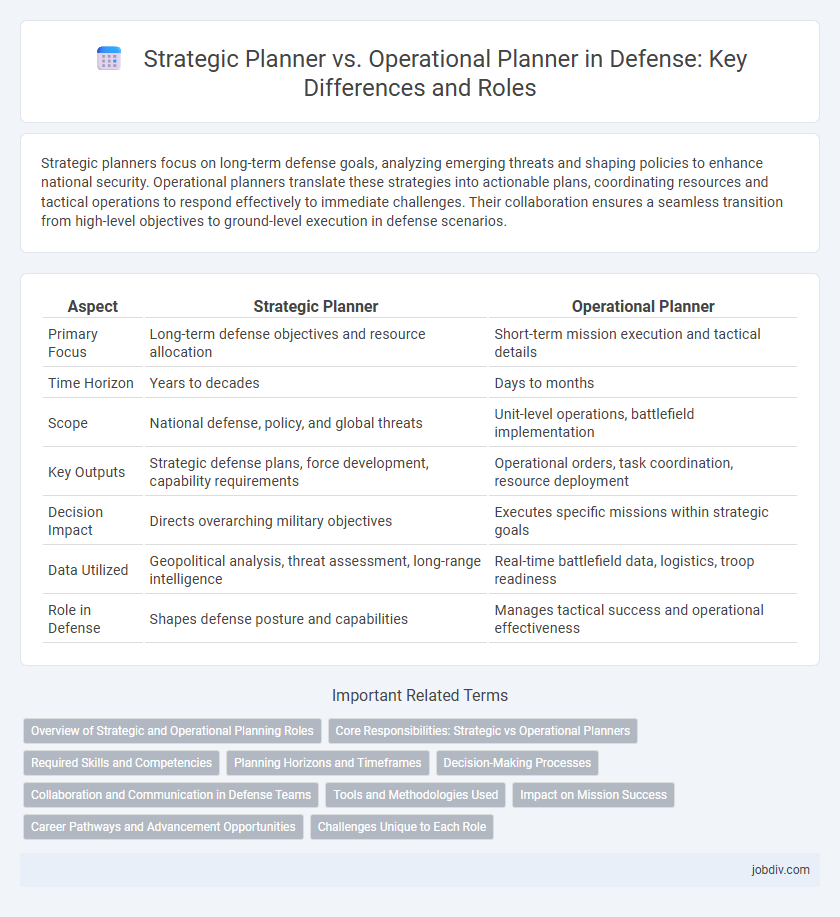Strategic planners focus on long-term defense goals, analyzing emerging threats and shaping policies to enhance national security. Operational planners translate these strategies into actionable plans, coordinating resources and tactical operations to respond effectively to immediate challenges. Their collaboration ensures a seamless transition from high-level objectives to ground-level execution in defense scenarios.
Table of Comparison
| Aspect | Strategic Planner | Operational Planner |
|---|---|---|
| Primary Focus | Long-term defense objectives and resource allocation | Short-term mission execution and tactical details |
| Time Horizon | Years to decades | Days to months |
| Scope | National defense, policy, and global threats | Unit-level operations, battlefield implementation |
| Key Outputs | Strategic defense plans, force development, capability requirements | Operational orders, task coordination, resource deployment |
| Decision Impact | Directs overarching military objectives | Executes specific missions within strategic goals |
| Data Utilized | Geopolitical analysis, threat assessment, long-range intelligence | Real-time battlefield data, logistics, troop readiness |
| Role in Defense | Shapes defense posture and capabilities | Manages tactical success and operational effectiveness |
Overview of Strategic and Operational Planning Roles
Strategic planners in defense focus on long-term objectives, analyzing geopolitical trends, and formulating overarching policies to enhance national security. Operational planners translate strategic goals into detailed, actionable missions by coordinating resources, timelines, and tactical efforts within military units. Both roles are crucial for synchronizing high-level defense strategies with on-the-ground execution to ensure mission success.
Core Responsibilities: Strategic vs Operational Planners
Strategic planners in defense focus on long-term goals, developing comprehensive plans that align with national security objectives and anticipated future threats. Operational planners translate strategic directives into actionable, short-term missions, coordinating troops, resources, and logistics to achieve specific battlefield outcomes. The collaboration between both roles ensures cohesive execution from high-level strategy to tactical implementation.
Required Skills and Competencies
Strategic planners in defense require advanced analytical skills, long-term vision, and proficiency in geopolitical risk assessment to develop comprehensive defense strategies. Operational planners need strong tactical expertise, real-time decision-making abilities, and coordination skills to efficiently implement strategic directives on the field. Both roles demand excellent communication, leadership, and adaptability to changing defense environments.
Planning Horizons and Timeframes
Strategic planners in defense focus on long-term planning horizons, typically spanning several years to decades, to shape overarching military objectives and force development. Operational planners concentrate on mid-term timeframes, ranging from weeks to months, translating strategic goals into specific campaigns and missions. Effective defense planning requires aligning the long-range vision of strategic planners with the actionable, time-sensitive tasks managed by operational planners.
Decision-Making Processes
Strategic planners in defense prioritize long-term decision-making, analyzing geopolitical trends and resource allocation to shape overarching military objectives. Operational planners focus on short-term decisions, coordinating tactical missions and managing real-time situational variables to achieve specific campaign goals. Decision-making processes in strategic planning emphasize foresight and adaptability, while operational planning demands rapid, precise responses within established frameworks.
Collaboration and Communication in Defense Teams
Strategic planners in defense focus on long-term objectives and overall mission goals, requiring high-level collaboration with senior leadership to align resources and policies effectively. Operational planners emphasize real-time coordination and communication among field units to ensure mission execution and adaptability in dynamic environments. Efficient collaboration between strategic and operational planners facilitates seamless information flow, enhances decision-making accuracy, and strengthens mission success rates.
Tools and Methodologies Used
Strategic planners in defense utilize advanced analytical tools such as scenario modeling, Geographic Information Systems (GIS), and wargaming simulations to forecast long-term threats and allocate resources effectively. Operational planners rely on real-time data integration platforms, mission planning software, and logistics management systems to execute detailed tactical operations and coordinate forces on the ground. Both roles employ decision support systems and risk assessment frameworks, but strategic planning emphasizes predictive analytics while operational planning focuses on immediate situational awareness.
Impact on Mission Success
Strategic planners shape long-term defense objectives by analyzing geopolitical trends and resource allocation, directly influencing mission success through effective prioritization and adaptive strategies. Operational planners translate strategic goals into actionable plans by coordinating logistics, personnel, and tactical execution, ensuring missions meet defined objectives efficiently. The combined impact of strategic foresight and operational precision enhances mission success by aligning broader defense aims with on-the-ground realities.
Career Pathways and Advancement Opportunities
Strategic planners in defense focus on long-term goals, engaging in high-level policy development and resource allocation, which often leads to senior leadership roles such as defense analyst or military strategist. Operational planners concentrate on short-term mission execution and tactical coordination, frequently advancing to positions like operations officer or mission commander. Career advancement for strategic planners typically involves greater involvement in interagency collaboration and national security strategy, while operational planners gain rapid promotion through demonstrated effectiveness in field operations and command roles.
Challenges Unique to Each Role
Strategic planners in defense face challenges such as long-term threat assessment, resource allocation across multiple domains, and aligning military objectives with national security policies. Operational planners encounter difficulties in real-time decision-making, coordinating logistics, and adapting to rapidly changing battlefield conditions. Both roles require distinct skill sets to manage complex, high-stakes environments effectively.
Strategic Planner vs Operational Planner Infographic

 jobdiv.com
jobdiv.com